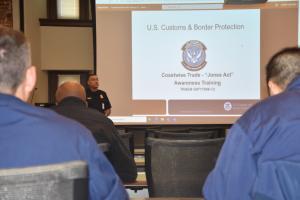
Earlier this month, the U.S. Customs and Border Protection (CBP) held a training exercise on enforcement of the Merchant Marine Act of 1920, also known as the Jones Act, a complex and tricky law that demands specificity from federal agents.
When established, the law limited how cargo could be transported within U.S. waters, requiring any cargo shipped between U.S. ports to be carried in American ships by American crews. Although times have changed significantly since then, the protectionist law remains under the jurisdiction of CBP’s Jones Act Division of Enforcement (JADE). Jade also works with the U.S Coast Guard in this area, as coastal trade laws also often involve domestic transportation, such as inland towing, ferry operations, harbor cruises, and dredging.
“Since its creation six years ago, we have levied more penalty proposals on Jones Act offenders than the previous 96 years combined,” Michael Hebert, supervisory CBP officer over JADE, said. “The Jones Act covers more than 25,000 miles of navigable waterways and 95,000 coastal miles, so we need to raise awareness and urge industry members and others to inform us of suspected violations.”
Penalties are levied against vessels ferrying passengers or merchandise between two points in U.S. waters if they are not built, documented, and owned within and by the United States. Some exceptions do exist, but by and large, the law purports to protect shipping lanes and citizens’ businesses. Fines can include fees equal to the cost of the merchandise involved or the transportation of the merchandise, whichever is greater, though these are often mitigated to lower levels.
JADE was first formed in 2016. The New Orleans Field Office, under which its latest training was conducted, covers ports of entry in Louisiana, Mississippi, Alabama, Arkansas, and Tennessee.




